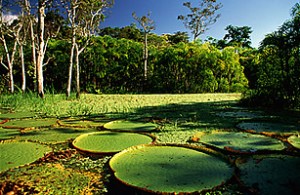
Getty Images
You probably wouldn’t know it from the U.S. media, but there’s a whole continent south of the U.S. Latin America rarely gets the media or public attention it deserves in part because of good reasons—years of relative political stability after the civil wars and juntas of the Cold War era, along with generally prosperous economies.
But while the rest of us are watching the wars in the Middle East or Central Asia, worrying about economic collapse in Europe or economic growth in Asia, Latin America is poised to explode on the global scene. Brazil’s economy grew by 7.5% last year, the highest rate in a quarter century, and the World Bank expects that the region as a whole will grow by 4.5% this year. Much of that growth is on the back of surging commodity production—especially energy. Latin America has one-fifth of the world’s proven oil reserves, and its importance on the global energy markets will only grow.
The region has something else too—amazing biodiversity. From the immense Amazon basin to the utterly unique Galapagos Islands, Latin America still possesses some of the world’s most impact and important forests, wetlands and wildlife left on the planet. The question going forward will be whether the region can grow rapidly—and allowing millions of people to rise out of poverty—without destroying that natural heritage. One glimpse of China, where economic growth has been accompanied by environmental destruction, shows what can happen if things go wrong.
That’s what makes a new initiative spearheaded by the Nature Conservancy (TNC) so valuable. The environmental group has convened the Latin American Conservation Council, a group of more than 30 CEOs and political leaders from around the region that will collaborate on some of the region’s pressing environmental problems: water security, food security and infrastructure development. The idea is simple: help the region grow the right way, and protect biodiversity and ecosystem services now instead of cleaning up later. “This is the right time for this idea,” says Mark Tercek, TNC’s president and CEO.
The council is co-chaired by Warburg Pincus managing director Alain Belda, a Brazilian, and Hank Paulson, the former Treasury Secretary, Goldman Sachs CEO and a longtime conservationist. Paulson, who helped put together a similar group in Asia in the 1990s with Singapore’s Lee Kuan Yew, says there’s a dawning awareness among Latin American executives that business has little choice but to grow green. “They know that we need nature more than nature needs us,” he told me today. “There’s never been a group like this coming together before.”
According to TNC, the council will focus on:
Nature-based solutions to water security – The Council will mobilize local business and political leaders around a goal of using nature-based solutions to help secure water supplies for Latin America’s most at-risk cities, benefitting as many as 100 million people;
Food security and sustainable landscapes and seascapes – The Council will engage in efforts by organizations that are specialized in agricultural, ranching and fisheries productivity to increase food production while protecting Latin America’s unique forests, grasslands and marine areas; and
Smart infrastructure development – The Council will address opportunities for businesses and governments to design Latin America’s energy, mining, tourism development and transportation infrastructure to dramatically reduce its impact on natural systems.
The effort is still in its early stages, but that’s the point. It took decades for green business practices to begin to get a foothold in the U.S. corporate world, and the rest of the planet doesn’t have time for such a long evolution. We’re squeezed for resources and space, with biodiversity and nature feeling the results. The only way we’ll survive with a livable planet in a future where Chinese and Brazilians and Colombians all demand consumer lifestyles is if development begins green, as Paulson knows. “Ultimately, we’ve got just one planet,” he says. And if we do this right, there will be room for all of us.
Bryan Walsh is a senior writer at TIME. Find him on Twitter at @bryanrwalsh. You can also continue the discussion on TIME’s Facebook page and on Twitter at @TIME


